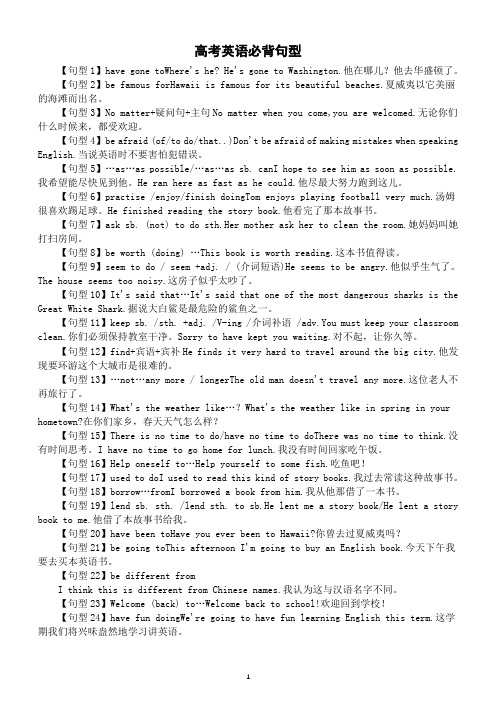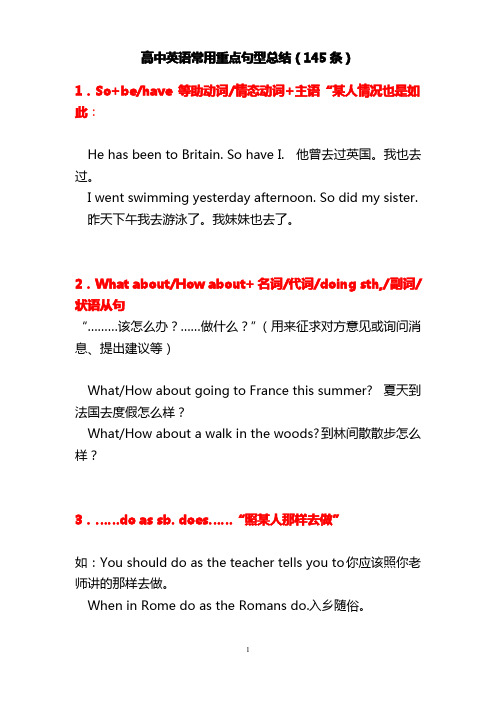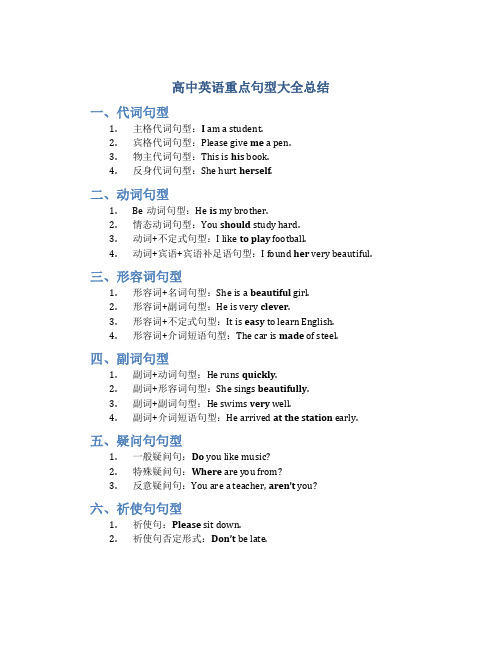高中英语重点句型
重点高中英语重要句型

重点高中英语重要句型————————————————————————————————作者:————————————————————————————————日期:高中英语重要句型1. There is something wrong with sb/sth. (某人或某物有毛病,不正常)如:There is something wrong with my watch= Something is wrong with my watch.类似的句型:What’s wrong/the matter with sb./sth?该句型在宾语从句中语序不变,因为what是主语。
I asked him what was wrong./ the matter with the bike.2. 强调句句型It is/was +被强调成分+that/who+其他成分这句型可以强调句子的主语、宾语、表语及状语等成分。
如果被强调的成分是表示人的词,可以用that或who/(whom)连接其他成分;被强调的成分是表示人以外的词,用that连接。
如:I saw John in Guilin last week.→ It was I who/ that saw John in Guilin last week.→ It was John whom/that I saw in Guilin last week.→ It was in Guilin that I saw John last week.→ It was last week that I saw John in Guilin.注意:(1)不可强调由since/as引导的原因状语从句以及although和whereas(而、却)引导的从属或并列分句。
(2)动词be除了is/was之外,可以有其他形式。
如:It may have been at Christmas that John gave Mary a handbag.(3) not…until句型。
高中英语高考必背句型(共50个)

高考英语必背句型【句型1】have gone toWhere's he? He's gone to Washington.他在哪儿?他去华盛顿了。
【句型2】be famous forHawaii is famous for its beautiful beaches.夏威夷以它美丽的海滩而出名。
【句型3】No matter+疑问句+主句No matter when you come,you are welcomed.无论你们什么时候来,都受欢迎。
【句型4】be afraid (of/to do/that..)Don't be afraid of making mistakes when speaking English.当说英语时不要害怕犯错误。
【句型5】…as…as possible/…as…as sb. canI hope to see him as soon as possible.我希望能尽快见到他。
He ran here as fast as he could.他尽最大努力跑到这儿。
【句型6】practise /enjoy/finish doingTom enjoys playing football very much.汤姆很喜欢踢足球。
He finished reading the story book.他看完了那本故事书。
【句型7】ask sb. (not) to do sth.Her mother ask her to clean the room.她妈妈叫她打扫房间。
【句型8】be worth (doing) …This book is worth reading.这本书值得读。
【句型9】seem to do / seem +adj. / (介词短语)He seems to be angry.他似乎生气了。
The house seems too noisy.这房子似乎太吵了。
高中英语常用重点句型总结(145条)

高中英语常用重点句型总结(145条)1.So+be/have等助动词/情态动词+主语“某人情况也是如此:He has been to Britain. So have I.他曾去过英国。
我也去过。
I went swimming yesterday afternoon. So did my sister.昨天下午我去游泳了。
我妹妹也去了。
2.What about/How about+名词/代词/doing sth,/副词/状语从句“………该怎么办?……做什么?”(用来征求对方意见或询问消息、提出建议等)What/How about going to France this summer?夏天到法国去度假怎么样?What/How about a walk in the woods?到林间散散步怎么样?3.……do as sb. does……“照某人那样去做”如:You should do as the teacher tells you to .你应该照你老师讲的那样去做。
When in Rome do as the Romans do.入乡随俗。
4.None of+名词/代词+do/does……“在……中没有任何一个做……”如:None of the telephones can work。
所有的电话都不能工作了。
None of them are/is interested in physics.他们中没有一个人对物理感兴趣。
5.Not+all+复数名词/不可数名词+are/is……“并非全部……”;“并不是所有的……”如:Not all the parts of the car will be made in the factory.并不是所有的汽车部件都在这家工厂制造。
Not all the students can pass the exam.并非所有的同学都能通过考试。
Not all factories here produce shirts.这儿的工厂不都生产衬衣。
高中英语句型最全归纳

常考句型1. be doing/ be about to do/be on the point of doing/had done…,when…(when:这时,强调一个动作的突然发生)1) I was walking along the river, when I heard a drowning boy cry for help.2) I was about to leave when it began to rain.3) I had just finished my test paper when the bell rang, announcing the exam was over.2. It was(not) +时间段+before +一般过去时“过了一段时间就……”It will(not)be+时间段+before +一般现在时“要过一段时间才会……”It is/ has been +时间段+ since…It was+点时间+ when…It was+时间状语+ that…(强调句)1) It was not long before he sensed the danger of the position.不久他就意识到他处境危险。
(动作已发生)2) It will be half a year before you graduate from the school.还有半年你才从这个学校毕业。
(动作未发生)3) It is 3 years since he worked here. = he left here.(since从句中的谓语动词若是延续性动词,要从这个动作结束的时候算起)4) It was 3 o’clock when they received the telephone.5) It was at 3 o’clock that they received the telephone.3. once…一旦……,表示时间和条件1) Once you start, you will never give up.2) Once you understand what the teacher explained, you will have no difficulty doing the work.4. the +比较级……,the +比较级……“越……越……”The more books you read,the more knowledge you will get.5. whether…or…无论是……还是……1) Whether the weather is good or bad, they will set off as they planned.2) Any person, whether young or old, has his own worth.6. 祈使句+or/otherwise +结果句或祈使句+ and +结果句1) Stop doing such a foolish thing, or you will be punished in time.2) More effort, and the problem would have been settled.7. every time/each time/next time/the first time/any time等短语引导时间状语从句,表示“每当,每次,下次,第一次,任何时候”。
初高中英语句型大全

初高中英语句型大全1. 基本句型- 主语 + 动词- 主语 + 动词 + 宾语- 主语 + 动词 + 间接宾语 + 直接宾语- 主语 + to be + 表语- 主语 + to be + 形容词- 主语 + to be + 名词- 主语 + to be + 副词- 主语 + to be + 现在分词- 主语 + to be + 过去分词- 主语 + 动词 + 不定式- 主语 + 动词 + 副词- 主语 + can/could/may/might/will/would/should + 动词- 主语 + have/has/had + 过去分词- there + be + 存在物2. 肯定句与否定句- 肯定句:主语 + 动词- 否定句:主语 + do/does/did not + 动词- 否定句(be动词):主语 + am/is/are/not + 表语/形容词/名词/副词/现在分词/过去分词3. 一般疑问句- 一般疑问句:助动词/Be动词 + 主语 + 动词- 特殊疑问句:特殊疑问词 + 一般疑问句- 特殊疑问词:what/when/where/who/why/how4. 祈使句- 祈使句:动词 + 宾语5. 陈述句与疑问句转换- 陈述句变疑问句:陈述句 + 吗?- 特殊疑问句变陈述句:特殊疑问词 + 陈述句6. 感叹句- 感叹句:How + 形容词/副词 + 主语 + 动词!7. 虚拟语气- If从句 + 主语 + 动词(过去式),主句 + would/could/might + 动词(原形)以上是初高中英语常用的句型大全,希望对你有所帮助!。
高中英语必修重点词汇短语句型语法大全

高中英语必修重点词汇短语句型语法大全Quantity, price, time and space are the most important things in investment.人教版高中英语必修3重点词汇、短语、句型、语法大全Unit1 Festivals around the world重点词汇、短语1. take place 发生2. religious 宗教的3. in memory of 纪念4. belief 信任;信心;信仰5. dress up 盛装;打扮6. trick 诡计;窍门7. play a trick on 搞恶作剧;诈骗8. gain 获得9. gather 搜集;集合10. award 奖品;授予11. admire 赞美;钦佩12. look forward to 期望;盼望13. day and night 日夜14. as though 好像15. have fun with 玩的开心16. permission 许可;允许17. turn up 出现;到场18. keep one’s word 守信用19. hold one’s breath 屏息20. apologize道歉21. obvious 显然的22. set off 出发;动身;使爆炸重点句型1. Please make sure when and where the accident took place. 请查清楚事故是何时何地发生的..2. Some festival are held to honour the dead; or satisfy and please the ancestors; who could return either to help or todo harm.还有一些节日;是为了纪念死者、满足或取悦祖先;因为祖先们有可能回到世上帮助他们;也有可能带来危害..3. In Japan the festival is called Obon;when people shouldgo to clean the graves and light incense in memory of their ancestors.非限制性定语从句在日本;这个节叫孟兰盆节;在这个节日里;人们要上坟、扫墓、烧香;以缅怀祖先..4. They dress up and try to frighten people.他们乔装打扮去吓唬别人..5. If they are not given anything; the children might play a trick.如果你什么也不打发给孩子;他们可能会捉弄别人..6. In India there is a national festival on October 2 to honour Mahatma Gandhi; the leader who helped gain India's independence from Britain.在印度;10月2日是纪念马哈特马.甘地的全国性节日;他是帮助印度脱离英国而独立的领袖..7. The most energetic and important festivals are the onesthat look forward to the end of winter and to the coming of spring.最富生气而又最重要的节日;就是告别冬天、迎来春天的日子..8. The country is covered with cherry tree flowers so thatit looks as though it might be covered with pink snow.整个国度处处都是樱花盛开;看上去就像罩上了一层粉红色的雪..语法总结情态动词定义:情态动词是一种本身有一定的词义、但要与动词原形及其被动语态一起使用;给谓语动词增添情态色彩;表示说话人对有关行为或事物的态度和看法;认为其可能、应该或必要等..情态动词数量不多;主要有下列:can could; may might; must; need; ought to; dare dared;shall should; will would;have to ;had better.一. can和could的用法1. 表示能力或客观可能性;还可以表示请求和允许..注意:①could也可表示请求;语气委婉;主要用于疑问句;不可用于肯定句;答语应用can..②can表示能力时;还可用be able to代替..2. 表示惊异、怀疑、不相信的态度..主要用在否定句、疑问句或惊叹句中3. “cancould + have + 过去分词”的疑问或否定形式表示对过去发生的行为怀疑或不肯定..4. 用在疑问句及否定句中;表示惊讶;不相信等..5. cannot…too...表示“无论怎样……也不过分”二. may和might的用法1. 表示许可..表示请求、允许时;might比may的语气更委婉一些;否定回答时口语中常用 no ; you can’t . or ; yes; please 用mustn’t表示“不可以”、“禁止”、“阻止”之意具有强烈禁止的意思..用May I…征询对方许可在文体上比较正式;在口气上比较客气..在日常口语中;用Can I ... 征询对方意见在现代口语中更为常见..2. 用于祈使句中表示祝愿..3. 表示推测、可能疑问句不能用于此意..4. “maymight + have + 过去分词”表示对过去发生的行为的推测..三. must和have to的用法1. 表示必须、必要..must表示主观多一些而have to则表示客观多一些回答must引出的问句时;如果是否定的回答;不能用mustn’t;而要用needn’t或don’t have to..2.“must be + 表语”的结构表示推测;它的否定或疑问式用can代替must..3. “must + have + 过去分词”的结构常用在肯定句中;表示对过去发生的行为的推测..它的否定或疑问式用can代替must..4. have to的含义与must相似;两者往往可以互换使用;但have to 有各种形式;随have的变化而定..注意:have to也可拼做have got to..四. dare和need的用法1. need表示“需要”;作情态动词时;仅用于否定句或疑问句中;在肯定句中一般用must; have to; ought to;或should代替..注意:needn't + 不定式的完成式“表示本来不必做某事而实际上做了某事”2. dare作情态动词时;主要用于疑问句、否定句和条件状语从句中;一般不用在肯定句中..3. dare和need常用作实义动词;有时态、人称和数的变化;所不同的是;作实义动词时;在肯定句中;dare后面通常接带to的不定式;在否定和疑问句中;dare后面可接带to或不带to的不定式..五. shall和should的用法1. shall的用法:①shall用于第一人称;表示征求对方的意愿..②shall用于第一、第三人称疑问句中;表示说话人征求对方的意见或向对方请示..③shall用于第二、第三人称;表示说话人给对方命令、警告、允诺或威胁..2. should的用法:①should表示劝告、建议、命令;其同义词是ought to;在疑问句中;通常用should代替ought to..②Whyor How + should结构表示说话人对某事不能理解;感到意外、惊异等意思..意为“竟会”..③“should + have + 过去分词”结构一般表示义务;表示应该做到而实际上没有做到;并包含一种埋怨、责备的口气..六. will和would的用法1. 表示请求、建议等;would比will委婉客气..2. 表示意志、愿望和决心..3. 用“will be”和“willwould + have + 过去分词”的结构表示推测;主要用于第二、三人称..前者表示对目前情况的推测;后者表示对已经完成的动作或事态的推测..4. would可表示过去反复发生的动作或某种倾向..5. 表料想或猜想..七. ought to的用法1. ought to表示应该..2. 表示推测..注意与must表示推测时的区别:He must be at home by now. 断定他已到家He ought to be home by now. 不十分肯定This is where the oil must be. 比较直率This is where the oil ought to be. 比较含蓄3. “ought to + have + 过去分词”表示过去应做某事而实际未做.. ought和should的区别:1.ought语气略强..2.should较常用..3.ought在美国英语中用的很少;而should却相当常用..4.ought属正式用语..八. used to;had better;would rather的用法1. used to表示过去的习惯动作或状态;现在已不存在;在间接引语中;其形式可不变..如:He told us he used to play football when he was young.2. had better意为“最好”;后接不带to的不定式..3. would rather意为“宁愿”;表选择;后接不带to的不定式..Unit2 Healthy eating重点词汇、短语1. diet 日常饮食;节食2. balance 平衡;天平3. fry 油炸4. ought to 应该5. lose weigh 减肥6. raw 生的;未加工的7. get away with 被放过;做坏事不受惩罚8. tell a lie 说谎9. win…back 赢回10. strength强项;长处;力量11. consult 咨询;请教12. earn one’s living 谋生13. debt 债14. in debt 欠债15. limit 限制;界限16. benefit 利益17. combine 联合;结合18. cut down 削减;删节19. before long 不久以后20. put on weight 增加体重重点句型1. The food you eat helps you grow in different ways.你吃的食物能以不同的方式帮你成长..2. Standing on top of the tall building; we could see the whole city.站在高楼的顶部;我们能看到整个城市..3. Which food contains more sugar哪一种食物含有更多的糖4. What could have happened可能发生了什么事5. Something terrible must have happened if Maochang was not coming to eat with him as he always did.要是茂昌不像往常那样和他一起吃饭;那问题一定严重了..6. Curiosity drove Wang Pengwei inside.王鹏伟受到好奇心的驱使;走了进去..7. We were surprised at finding the house empty.我们发现这个房子空无一人;感到惊讶..8. They had me repeat the message.他们让我把口信又重说了一遍..9. I have a lot of work to do.我有很多工作要做..10. He did not look forward to being in debt because his restaurant was no longer popular.他可不希望由于他的餐馆不再受欢迎而负债..语法总结情态动词详见第一单元语法总结Unit3 The Miliion Pound Bank Note 重点词汇、短语1. bring up 抚养2. scene 现场;景色3. permit 许可;通行证4. go ahead 前进5. by accident 偶然6. stare 凝视;盯着看7. stare at 盯着看8. spot 发现;认出;斑点;污点9. account 说明;总计有;账目;10. account for 导致;做出解释11. seek 探索;寻求12. contrary 反面;对立面13. on the contrary 与此相反14. take a chance 冒险15. in rags 衣衫褴褛16. indeed 真正地17. as for 关于;至于重点句型1. Have you ever made a bet with your friends 你曾和你的朋友们打过赌吗2. Did he help you by accident or on purose他是碰巧还是有意帮你3. I wonder; Mr Smith; if/whether you’d mind us moving your flowers outdoors.史密斯先生;我不知道你是否介意我们把你的花移到室外去..4. You’re about to hear the most incredible tale.你们马上就要听到一个最难以置信的故事..5. Permit me to say a few words.请允许我说几句话..6. After the rain; we went ahead with our work.雨停之后;我们继续工作..7. And it was the ship that brought you to England.正是那艘船把你带到了英国..8. I earned my passage by working as an unpaid hand; which accounted for my appearance.我是作为一个不拿工资的帮手赚来我的船费;这就是我为什么会衣冠不整的原因了..9. Dick found himself walking in the direction of the church.迪克发现自己不知不觉朝教堂方向走去..10. Even if/though he is very nice; I don’t trust him.即使他很好;我也不太相信他..语法总结名词性从句在句子中起名词作用的句子叫名词性从句 Noun Clauses.. 名词性从句的功能相当于名词词组; 它在复合句中能担任主语、宾语、表语、同位语等;因此根据它在句中不同的语法功能;名词性从句又可分别称为主语从句、宾语从句、表语从句和同位语从句..一. 名词性从句的连接词引导名词性从句的连接词可分为四类:1. that无含义;不充当成分2. whether; if有“是否”的含义;但不充当成分3. 连接代词:what; whatever; who; whoever; whom; whomever;whose; which;whichever.在从句中做主语、宾语、表语和定语连接副词:when; whenever;where;wherever; how; however;why在从句中做状语4. as if;as though;because不充当成分;在名词性从句中只引导表语从句二. 四类名词性从句语法要点1.主语从句在整个句子中用作主语的从句叫主语从句..What he wants to tell us is not clear.他要跟我们说什么;还不清楚..It is known to us how he became a writer.我们都知道他是如何成为一名作家的..Where the English evening will be held has not yet been announced.英语晚会将在哪里举行;还没有宣布..it作形式主语:有时为避免句子头重脚轻;常用形式主语it代替主语从句作形式主语放于句首;而把主语从句置于句末..It is clear that he is innocent in the accident.很明显;他在这场事故中是无辜的..2. 宾语从句在整个句子中用作宾语的从句叫宾语从句..He has told me that he will go to Shanghai tomorrow.他已经告诉我他明天要去上海..We must never think that we are good in everything while others are good in nothing.我们决不能认为自己什么都好;别人什么都不好..it作形式宾语:在“主语+谓语+宾语+宾补”的句型中;如果宾语是从句的形式;则必须用it做形式宾语;把真正的宾语即宾语从句置于句末..We found it impossible that the so much work will be finidhed in one day.我们发现一天之内完成这项工作不可能..3. 表语从句在整个句子中用作表语的从句叫表语从句..The fact is that we have lost the game.事实是我们已经输了这场比赛..That is why he didn’t come to the meeting.那就是他为什么不到会的原因..It looks as if it is going to rain.看上去天要下雨了..This is because he has been working hard these days.这是因为这些天他一直工作很努力..注意:because;as if 和 as though在名词性从句中只能引导表语从句..4. 同位语从句在整个句子中用作同位语的从句叫同位语从句..同位语的含义:在句子中;如果有两个名词;并且后一个名词是对前一个名词的解释说明;它们两个指的是同一个人或同一个物;那么;后面的名词就叫前面名词的同位语..例如:This is my friend; Tom.Tom是my friend 的同位语..可用于同位语从句的名词有advice、demand、doubt、fact、hope、idea、information、message、news、order、problem、promise、question、request、suggestion、truth、wish、word等抽象名词.. The news that we won the game is exciting.我们赢得这场比赛的消息令人激动..I have no idea when he will come back home.我不知道他什么时候回来..The thought came to him that Mary had probably fallen ill. 他想到可能玛丽生病了..同位语从句和定语从句的区别:that作为关系代词;可以引导定语从句;充当句子成分;在从句中作宾语时可以省略; that引导同位语从句时;起连词的作用;没有实际意义;不充当句子成分;一般不能省略..试比较下面两个例句:I had no idea that you were here.我不知道你在这里..that无含义;that you were here 指的就是idea;所以是同位语从句;不能省略thatHave you got the ideathatthis book gives you这本书给了你想法吗that指的是the idea;that引导定语从句;作宾语;可以省略三. 连接词that在名词性从句中可以省略的三种情况1.it 做形式主语;that引导主语从句时It is said that he has been studying abroad.据说他一直在国外学习..2.动词宾语从句中I thinkthat you have much to improve in English.我认为你的英语需要提高的有很多..3.形容词宾语从句中I am afraid that I will be late.恐怕我要迟到了..Unit4 Astronomy:the science of the stars 重点词汇、短语1. system 系统;体系2. theory 学说;理论3. violent 猛烈的;激烈的;4. in time 及时;终于5. unlike 不同;不像6. harmful 有害的7. lay eggs 下蛋8. exist 存在;生存9. give birth to 产生;分娩10. in one’s turn 轮到某人11. prevent from 阻止12. puzzle 谜;难题/使迷惑13. pull 拉;牵引力14. cheer up 感到振奋15. now that 既然16. break out 突发;爆发17. watch out 密切注视重点句型1. We usually think of science subjects as physics; chemistry; biology and mathematics.通常我们认为科学学科为物理、化学、生物、和数学..2. When are they to hand in their plan他们的计划什么时候交上来..3. Whether we help him or not; he will fail.不论我们帮助他与否;他都将失败..4. It exploded loudly with fire and rock; which were in time to produce the water vapour; carbon dioxide; oxygen; nitrogen and other gases; which were to make the earth’s atmosphere.它地球巨大的爆炸喷出了烈火与岩石;最终产生了水蒸气、二氧化碳、氧、氮和其他多种气体;从而形成了地球的大气层..5. It was quite different from what I expected.它和我原来想的很不一样..6. This made it possible for us to learn English better.这使得我们有可能把英语学得更好..7. Scientist believe that taking carbon dioxide from the atmosphere and filling the air with oxygen helped life to develop.科学家认为;从大气中吸取二氧化碳;并向空气中释放氧气;有助于生命的发展..8. He has experience as well as knowledge.他既有学识又有经验..9. They are putting too much carbon dioxide into the atmosphere ;which prevents heat from escaping from the earth into space.他们把太多的二氧化碳释放到大气层中;这使得热量不能从地球上散发到太空中..10. Whether life will continute on the earth for millions of years will depend on whether this problem can be solved.生命是否会在地球上延续几百万年要取决于这个问题能否得到解决..语法归纳名词性从句详见第三单元语法总结Unit5 Canada—“The Ture North”重点词汇、短语1. rather than 与其;不愿2. chat 聊天;闲聊3. surround 包围;围绕4. measure 测量;衡量;判定5. settle down 定居;平静下来6. manage to do 设法做7. catch sight of 看见;瞥见8. have a gift for 对…有天赋9. within 在…之内;10. border 边界;国界;边沿;与…接壤11. mix 混合;调配12. mixture 混合物13. confirm 证实;证明;批准14. distance 距离;远方15. in the distance 在远处16. nearby 在附近17. tradition 传统;习俗18. impress 使印象深刻重点句型1. Canada is the second largest country in the world.加拿大是世界上第二大的国家..2. Success is within our grasp now.现在我们成功在望了..3. I’m feeling slightly better today.我今天感到好一点了..4. I prefer to play football rather than stay at home.我宁愿踢足球而不愿呆在家里..5. He gave me money as well as advice.as well as 和;同;也他给我忠告并且给我钱..6. These books are mine; the rest are yours.这些书是我的;其他的都是你的..7. I asked her a question but she remained silent. remaine 是连系动词;意思是“保持;仍然是”我问了她一个问题;但她保持沉默..8. Many people think it is the most beautiful city in Canada; as it is surrounded by mountains on the north and east and the Pacific Ocean on the west.许多人都认为温哥华是加拿大最美丽的城市;因为来自它的北面和东面都被大山包围;而西面濒临太平洋..9. Many of them have a gift for working with animals and they can win thousands of dollars in prizes.他们中的许多人拥有与兽共舞的天分;因而能赢得数千美元的奖金..10. You can have a view of Paris from the Eiffel Tower.从埃菲尔铁塔上你可以看到巴黎全景..11. Around noon they arrived in Toronto; the most wealthy and biggest city in Canada.大约中午时分她们到了多伦多—加拿大最富有、最大的城市..12. I accompanied him as far as the bus stop.我陪他一直走到公共汽车站..。
高中英语重点句型大全总结

高中英语重点句型大全总结一、代词句型1.主格代词句型:I am a student.2.宾格代词句型:Please give me a pen.3.物主代词句型:This is his book.4.反身代词句型:She hurt herself.二、动词句型1.Be动词句型:He is my brother.2.情态动词句型:You should study hard.3.动词+不定式句型:I like to play football.4.动词+宾语+宾语补足语句型:I found her very beautiful.三、形容词句型1.形容词+名词句型:She is a beautiful girl.2.形容词+副词句型:He is very clever.3.形容词+不定式句型:It is easy to learn English.4.形容词+介词短语句型:The car is made of steel.四、副词句型1.副词+动词句型:He runs quickly.2.副词+形容词句型:She sings beautifully.3.副词+副词句型:He swims very well.4.副词+介词短语句型:He arrived at the station early.五、疑问句句型1.一般疑问句:Do you like music?2.特殊疑问句:Where are you from?3.反意疑问句:You are a teacher, aren’t you?六、祈使句句型1.祈使句:Please sit down.2.祈使句否定形式:Don’t be late.结语以上是高中英语常见的重点句型大全总结,掌握这些句型可以帮助你更准确、流利地表达自己的想法。
在学习英语的过程中,多加练习,不断积累,定能取得更好的进步!。
高中英语常用重点句型145句

高中英语常用重点句型145句1.So+be/have等助动词/情态动词+主语某人情况也是如此如:He has been to Britain. So have I. 他曾去过英国。
我也去过。
I went swimming yesterday afternoon. So did my sister.昨天下午我去游泳了。
我妹妹也去了。
2.What about/How about+名词/代词/doing sth,/副词/状语从句该怎么办?做什么?(用来征求对方意见或询问消息、提出建议等)What/How about going to France this summer? 夏天到法国去度假怎么样?What/How about a walk in the woods?到林间散散步怎么样?3.do as sb. does照某人那样去做如:You should do as the teacher tells you to . 你应该照你老师讲的那样去做。
When in Rome do as the Romans do.入乡随俗。
4. None of +名词/代词+do/does在中没有任何一个做如:None of the telephones can work。
所有的电话都不能工作了。
None of them are/is interested in physics.他们中没有一个人对物理感兴趣。
5.Not +all+复数名词/不可数名词+are/is并非全部;并不是所有的如:Not all the parts of the car will be made in the factory.并不是所有的汽车部件都在这家工厂制造。
Not all the students can pass the exam. 并非所有的同学都能通过考试。
Not all factories here produce shirts. 这儿的工厂不都生产衬衣。
- 1、下载文档前请自行甄别文档内容的完整性,平台不提供额外的编辑、内容补充、找答案等附加服务。
- 2、"仅部分预览"的文档,不可在线预览部分如存在完整性等问题,可反馈申请退款(可完整预览的文档不适用该条件!)。
- 3、如文档侵犯您的权益,请联系客服反馈,我们会尽快为您处理(人工客服工作时间:9:00-18:30)。
1.So+be/have等助动词/情态动词+主语“某人情况也是如此”如:
He has been to Britain. So have I. 他曾去过英国。
我也去过。
I went swimming yesterday afternoon. So did my sister.
昨天下午我去游泳了。
我妹妹也去了。
2.What about/How about+名词/代词/doing sth,/副词/状语从句
“………该怎么办?……做什么?”(用来征求对方意见或询问消息、提出建议等)
如:What/How about going to France this summer? 夏天到法国去度假怎么样?What/How about a walk in the woods? 到林间散散步怎么样?
3.……do as sb. does……“照某人那样去做”
如:You should do as the teacher tells you to . 你应该照你老师讲的那样去做。
When in Rome do as the Romans do. 入乡随俗。
4、none of +名词/代词+do/does……“在……中没有任何一个做……”
如:None of the telephones can work。
所有的电话都不能工作了。
None of them are/is interested in physics. 他们中没有一个人对物理感兴趣。
5.Not +all+复数名词/不可数名词+are/is……“并非全部……”;“并不是所有的……”如:Not all the parts of the car will be made in the factory.
并不是所有的汽车部件都在这家工厂制造。
Not all the students can pass the exam. 并非所有的同学都能通过考试。
Not all factories here produce shirts. 这儿的工厂不都生产衬衣。
6、主语+系动词+the same as /the same…… as ……“和……一样”
如:The English teacher is the same age as my father.
英语老师的年龄跟我父亲的一般大。
My friend looks the same as before. 我朋友看起来没有多大变化。
7.It is /was+形容词+不定式“做某事是……”
如:It is wonderful to travel in that great forest.
在那片大森林里旅行,真是太美了。
It is very nice to meet you. 见到你真高兴。
8.主语+be about to do……+when…“……正要做某事时……”
如:This afternoon I was just about to go swimming when luckily our guide saw me and shouted at me……
今天下午我正要下水去游泳,这时幸亏我们的向导看见我,对我大声喊道……
I was about to go to bed when there was a ring.
我正要睡觉,这时忽然电话铃响了。
9.What(a/an)+名词+主语+谓语! How+形容词/副词+主语+谓语!
“多么……;……真是……”如:
What a bad sight it was! 多么凄惨的一幅景象啊!
What dangerous fish they are! 这些鱼真凶恶!
What fine weather (it is)! /What a fine day (it is)! 多好的天气啊!
How silly the questions were! 那些问题真愚蠢!
10.Isn’t it……?/Don’t you do……?(否定疑问句用来表示对某事感到吃惊或责备)
如:Isn’t it comfortable to sit in the Chinese chair?
坐在这把中国式的椅子上难道不舒服吗?
Don’t you see I’m one of yours? 难道你看不出我是你们的同类吗?
11.There is nothing but/except……“除了……外别无其他”
如:Under the soil there is nothing but/except sand. 土壤下面尽是沙子。
For miles and miles I could see nothing but/except a great fire and lots of smoke.
绵延数英里,我们看到的尽是大火和浓烟。
12.It takes /took/will take+sb+some time+to dosth.
“某人花多少时间做某事”
如:
It took 100 workers one month to complete the bridge.
100个工人花了一个月的时间建成了这座大桥。
It will take me an hour to do my homework.
我将花一小时的时间来做完家庭作业。
13.A is……times +形容词比较级/副词比较级+than B “A比B(大、小、高、低等)……倍”
如:The population in and around San Francisco is now ten times more than it was in 1906.
现在旧金山市区和郊区的人口是1906年的10倍以上了。
The plane can travel many times faster than the train.
飞机飞行的速度是火车的好几倍。
14.A is ……times as+形容词/副词+as B “A是B的……倍”
如:This year they produced ten times as much grain as they did 5 years ago.
这一年他们生产的粮食是5年前的10倍。
15.主语+don’t +think/believe/expect/imagine/suppose+宾语从句
“认为……不会……”这类动词用来引导一个否定概念时,通常是把这类动词变成否定,
而不是把其后宾语从句中的谓语动词变成否定。
这在语法上叫做否定的转移。
如:I don’t think I will see Mary this morning.
我认为今天早上我见不到玛丽。
I don’t suppose she will marry her daughter to you .
我认为她不会把女儿嫁给你。
16、主语+prefer+A to B“…喜欢A而不喜欢B”;“…喜欢A胜过喜欢B”
如:主语+prefer to do sth. ……喜欢做某事
主语+prefer to do sth1.+rather than do sth …喜欢做事1胜过喜欢做事2
主语+prefer doing sth1 to doing sth2 …喜欢做事1胜过喜欢做事2
主语+prefer sb to do st ……喜欢某人做某事
I prefer walking along the country road to staying at home watching TV all the time. 我喜欢沿着乡村道路散步,不喜欢呆在家中守着电视看个不停。
She prefers chemistry to maths. 他喜欢化学胜过数学。
17.Would you please do…?“请你干某事好吗?”(委婉、客气地表示请求)
如:Would you please read the letter in public? 你当众读读这封信,好吗?
Would you please pass me the pictures? 请你递给我那些图片好吗?
18.主语+谓语+形容词比较级/副词比较级+and+形容词比较级/副词比较级
“……越来越……”(这种双重比较的结构,表示持续不断的变化)
如:When spring comes, the day is getting longer and longer.
春天来了,白天变得越来越长。
The kite is flying higher and higher. 风筝飞得越来越高了。
19.Why don’t you do……?“为什么你不……?”
Why not do……?“为什么不……?”
You had better do……“你最好还是……”
这三个句型用来向朋友提出忠告或建议。
如:
Why don’t you use your knife? 为什么不用你的刀子呢?
Why not just wear a flower? 为什么不只戴一朵花呢?
You’d better stay here for the night. 你最好在这里过夜。
20.主语+find+it/it’s+形容词+不定式(短语)“……发现做某事是……的”如:He found it /it’s important to study the situation in Russia.
他发现研究俄国的形势是很重要的。
I find it/it’s very funny to wear such a hat.。
